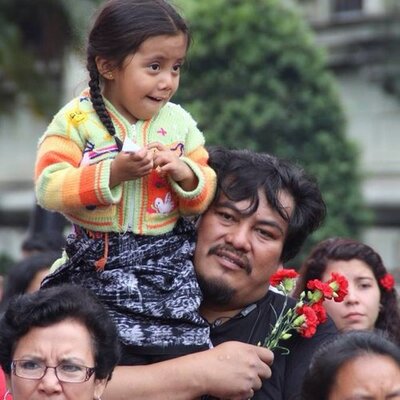Daniel Pascual Hernández is Maya K’iche’, and has been a member of the Committee of Rural Unity (Comité de Unidad Campesina) -CUC- of Guatemala since he was 10 years old. He is currently its General Coordinator. He was also a member of the National Council of the Peace Accords from 2004 to 2006, where he participated in the drafting of the Peace Accords in Guatemala. As a human rights defender, he has requested preventive measures from the IACHR due to the harassment and threats he constantly receives.
What do you think are the current challenges in the cooperation sector?
Organizations, partners or counterparts, a term to be defined,…NGOs do not enter into a dialogue with them, each one determines the relationship, which we do not consider as a donation, because in that case it would be the organization or the movement that defines the terms or topics, but rather it is the development community that determines agendas, using forms prepared by technicians who are not in the field, who do not know the economic, social and political conditions, tax regimes, real conditions on the ground, where you don’t get invoices or quotations to make an event or pay for a certain kind of work.
Solidarity aid supports us with resources, but the investment part, as if we had personnel, vehicles, but they no longer finance personnel. Other NGOs that execute projects, with an overhead of 10 or 15%, however, it’s us they punish, and this has to be discussed.
China is entering heavily into agreements with governments, thereby contributing to the destruction of the North-South development community, because these are agreements with states, and governments are therefore no longer interested in solidarity aid. This is how the expulsion of NGOs can be understood, because governments benefit from bilateral agreements..
In Guatemala, new laws are being made to restrict us, which NGOs accept, but we are being inundated with bureaucracy, they are burdening us with red tape that suffocates us, just like with the codes of international NGOs that, due to some slip-up, increasingly require us to have criminal and police records, for example, and with that we are out, because precisely for defending human rights, governments like the one in Guatemala condemn us and the development community, instead of supporting us, withdraws its help.
How to deal with the national legislation, which is being shut down for organizations that are resisting this anti-democratic government, how are we going to survive? We know how to work without economic support, those of us who have always worked in human rights, but this is a new context where the States are restricting their legislation and are throwing due process, judicial independence, human rights, etc. down the drain.
Regarding feminism, it is not enough to empower women when they have to face their husbands, fathers or brothers when machismo is in full force; we have to do it together. At CUC we feel the pressure coming from outside, with rejection of men. We have reached a moment where there is a separation between feminism and the vision of the Mayan people. At this summit in Guatemala, the women said that they are not going to address the issue of feminism, but rather the vision of the Mayan people regarding how the relationship between men and women should be based on the principles of complementarity and duality of the Mayan cosmovision.
How do you consider they should be faced?
We need a dialogue with the solidarity community on how they will support us, whether they are going to play their part with us or abandon us when we are no longer there. We went head-on in the fight against corruption, but then when things got complicated, we were left on our own, with the people. If nothing is done, Guatemala’s democracy will continue to disappear.
How can we decolonize ourselves, so that women can assume their role, but without dividing and falling into an anthrocentric situation?
The challenges are going to become more and more complicated and this is a criticism that I am still directing at some NGOs, that they began to train us to do advocacy, lobbying, but this is not the time for that anymore, we have to push people to be involved in the State to make decisions on our behalf. The movements should be able to reach the State, it is a challenge because we were told that in democracy we, the movements, should make others represent us and advocate as the NGOs propose, but now we believe that we should win elections and be in government.



